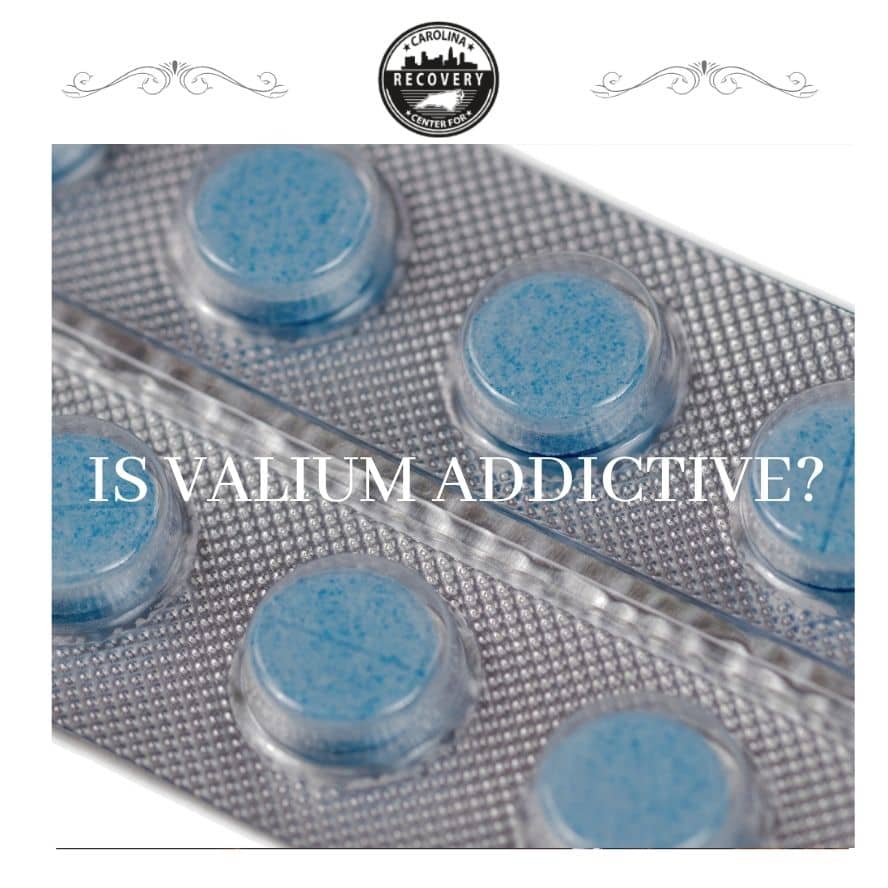Is Valium Addictive?

Medically Verified: 2/1/24
Medical Reviewer
Chief Editor

All of the information on this page has been reviewed and verified by a certified addiction professional.
Many people believe that prescription drugs are always safe to use, but prescription drug abuse is a serious problem in the United States. Some prescription medications, including Valium, can be addictive. People who take Valium and other addictive prescription drugs must be aware of the signs of addiction and seek help as soon as they recognize that they need it.
Valium addiction is a serious and complex condition that requires treatment and ongoing support. Reach out to the Carolina Center for Recovery specialists to find the help you need to put Valium addiction in the past.
What is Valium (Diazepam)?
Valium–also known as diazepam– is a prescription medication people take to relieve symptoms of anxiety, alcohol withdrawal, seizure disorders, and several other medical conditions. Valium is a benzodiazepine medication that slows down activity in a person’s central nervous system (CNS). The effects of Valium last longer than other benzodiazepines.
Valium is available in a tablet or solution. People should only take Valium if a doctor prescribes it, and only as prescribed. Doctors typically do not prescribe it for long periods. Generally, people should only take it for four to six weeks to limit the risk of addiction.
Can You Become Addicted to Valium?
You can become addicted to Valium. Valium and other benzodiazepines have the potential for dependence and addiction. Taking Valium in large doses or for long periods can cause changes in your body and brain, making it very challenging to stop using the drug when you want to. Over time, people may become addicted to Valium. Addiction can happen quickly, and people may not always realize their use has become dangerous.
You are more likely to become addicted to Valium if you take it without a prescription–also known as taking it recreationally–or if you take it differently than your doctor tells you to. Some people may develop tolerance and dependence on Valium, even when taking it as prescribed. It’s important to know the signs of Valium abuse and addiction and seek treatment if you recognize a problem.
Recognizing Valium Addiction
One of the first symptoms of Valium addiction is tolerance. Tolerance occurs when your body becomes accustomed to the presence of a substance and requires more to feel the effects of the drug. People who take Valium differently than prescribed–such as taking it more frequently, in higher doses, or for longer periods–may develop tolerance quickly and require more of the drug to get the effects they want.
Some of the other symptoms of Valium addiction include:
- Experiencing intense cravings for Valium
- Isolating
- Neglecting responsibilities at home, work, or school
- Losing interest in hobbies, relationships, and other things they once enjoyed
- Changes in mood, appearance, sleep, and appetite
- Continuing to use Valium despite harm to physical health, emotional well-being, relationships, and more
People who use Valium regularly or heavily may also experience withdrawal symptoms when they stop taking it. Valium withdrawal symptoms include:
- Headaches
- Nausea and vomiting
- Stomach pains
- Cramps
- Tremors
- Elevated blood pressure
- Increased heart rate
- Mood swings
- Panic attacks
- Depression
- Fever
- Chills
- Lightheadedness
Some people may experience seizures or extreme anxiety and depression. It’s important to seek medical and emotional support during detox to avoid dangerous complications and early relapse.
What Steps to Take If You Are Addicted to Valium
If you take prescription Valium and notice signs of dependence or addiction, speak to your doctor about what you notice. Your doctor will help you safely stop using Valium and find alternative treatment methods. They may recommend substance abuse treatment.
If you are taking Valium recreationally, you must seek treatment to stop safely. Finding the help you need doesn’t have to be overwhelming. Follow these steps to address Valium addiction.
Get an assessment
Your doctor or an addiction specialist will perform a substance abuse evaluation to determine which course of treatment will be most helpful. The assessment will include a physical exam, lab testing, and questions about your substance use, family history, and other relevant information.
Seek treatment
Valium addiction treatment is available in many settings and several levels of care. You may require inpatient or residential treatment, or you may get the help you need in an outpatient setting.
Regardless of your level of care, your Valium addiction treatment plan will include evidence-based and holistic therapies to help you address your addiction’s physical, behavioral, and emotional components. These include:
- Individual, group, and family counseling
- Medications
- Mental health treatment
- Relapse prevention education
- Holistic therapies like nutrition support, mindfulness, exercise, massage, and more
The length of your treatment program depends on the severity of your addiction and other factors.
Follow an aftercare plan
After completing your Valium addiction treatment program, you’ll need to develop and follow an aftercare plan that will keep you active in recovery. Your aftercare plan might include regular medical and mental health appointments, attending 12-step meetings or other support groups, spending time in a sober living home, and other activities that support lifelong sobriety.
Get Help for Valium Addiction Now
If you or someone you love is addicted to Valium or struggles with other substance abuse, contact the Carolina Center for Recovery team. Our admissions specialists can help you find the treatment program to help you put addiction in the past and move forward into a healthier future.
References:
1. https://www.accessdata.fda.gov/drugsatfda_docs/label/2016/013263s094lbl.pdf

